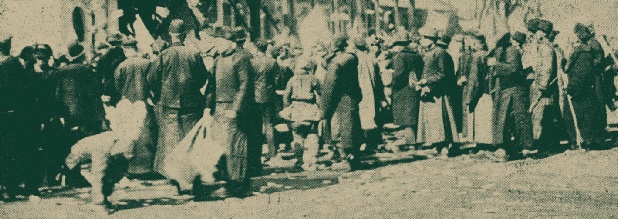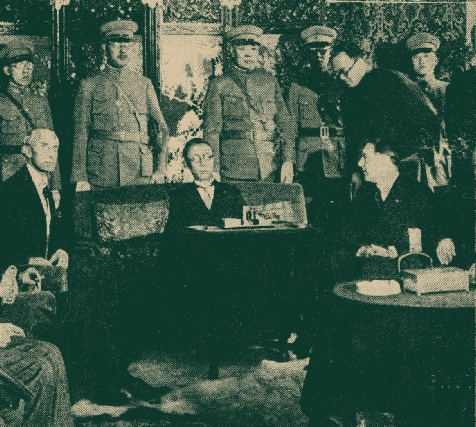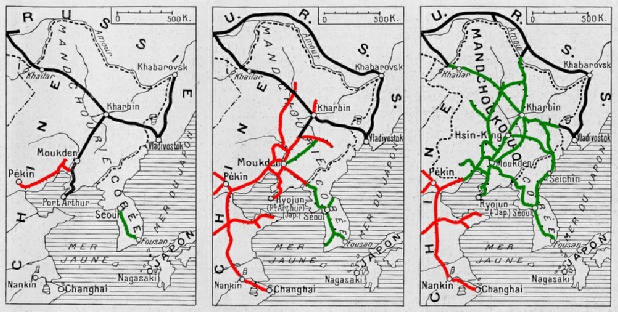Overview
You can't talk about Manchukuo without mentioning the history of this region: Manchuria. It's as big as France, Great Britain and Germany combined: a clearly defined quadrilateral bounded to the west by the Khingan Mountains, to the north by the Amur River, to the east by the Ussuri River and the Korean border, and to the south by the Liaodong Peninsula. Twentieth century Chinese simply say: Dong sans cheng, the "three eastern provinces", Heilongjiang, Jilin and Liaoning. The political formations that have succeeded one another in this region since the beginning of our era have controlled territories that are sometimes larger, sometimes smaller. Manchuria cannot even be defined as an ethnic entity, since Chinese, Koreans, Mongols and Tungus have mingled with the "Manchus" proper since ancient times. It was only for a very brief period (1931-
International challenges.
From 1803, the imperial authorities opened Manchuria to Chinese peasant colonisation. This migration increased during the 19th century and was encouraged by the government (in contrast to the policy of privileged seclusion of Manchuria followed until the 18th century), insofar as an almost depopulated Manchuria was difficult to resist pressure from the great powers.
At the end of the 19th century, Manchuria suddenly changed its geopolitical status. From a situation of confinement and isolation in a region of almost deserted mountains and forests, it suddenly found itself at the heart of international rivalries in the Far East. In 1858-
Russian penetration of Manchuria intensified at the end of the century, at a time when all the great powers were seeking to secure economic and military advantages in China by force. In 1897, Germany was granted the magnificent port of Tsing Tao; in April 1898, France the port of Kouang Tchéou Wan; in June of the same year, England the port of Wei Hai Wei, opposite Port Arthur. Still in 1898, Russia obtained the right to build a railway line, the "Transmandchurian", running directly from Irkutsk to Vladivostok, to set up a military base in Port-
1905 1931 1935
Evolution of railway lines: Russian; Chinese; Japanese
This neighbourliness worried Japan, which also coveted the region's riches and provoked the Russo-
At the end of the 19th century, Manchuria, torn between the powers, far from the central government and lacking rigid social structures due to the late Chinese settlement, was the classic land of adventurers and rebels. They came together to form bands of Honghuzi (Red-
The general upsurge and military anarchy that characterised the entire period in China following the republican revolution of 1911 particularly affected Manchuria, due to its marginal position. This was the era of the "warlords", who fought over the provinces.
The Mukden incident
As long as North China was at war with South China, the Japanese held the advantage because they had made an ally of the master of Manchuria, Zhang Zuolin, whom they supported financially and materially. Ambition came with success, and he dreamed of conquering the whole of China. However, his ambitions worried his Japanese protectors, who had him assassinated in an assassination attempt on June 4th 1928. But things changed when his son Zhang Xueliang succeeded him, who pursued a policy of reunification with China and no longer had the same reasons to spare the Japanese, who found themselves facing the nationalists. The Japanese government took a dim view of this as it felt its influence was weakening and its positions threatened. Once again, the military acted on their own initiative: on September 18th 1931, they blew up the railway line near Moukden, close to the largest Chinese garrison stationed in the country. The Lytton Commission presented its report to the League of Nations, based on the testimonies of the main protagonists:
"On the morning of Saturday September 19th 1931, the inhabitants of Moukden woke up to find that the town was in the hands of Japanese troops. Shots had been heard during the night, but there was nothing extraordinary about that; for the whole week, the people of Moukden had heard them every night as the Japanese carried out manoeuvres with rifle and machine gun fire. No doubt the cannon shots and the whistling of the shells during the night of September 18th led the population to believe that the rehearsal was a little louder than usual."
Of course, the Japanese version of events claims that it was a Japanese patrol that was attacked by Chinese soldiers, while the Chinese version claims the opposite. Negotiations ensued within the League of Nations, as summarised below:
"The repercussions of these events were considerable. The Japanese situation was made very difficult in many Chinese cities, even outside Manchuria. The Nanjing government lodged diplomatic protests with the Tokyo government and appealed to the League of Nations. The Council heard the representatives of the two countries and finally, before going its separate ways, the Geneva assembly passed a resolution taking note of the peaceful assurances expressed by the two antagonists. It convened the Council for an exceptional meeting on October14th to re-
The last Emperor.
While interminable debates were taking place at the League of Nations, the Japanese were working in the shadows. Is there not a young man in Peking who has rights over Manchuria? What could be simpler than giving him back his throne? And so it was done: the Japanese loaded Pu Yi onto a steamer and took him to Dairen on November 13th 1931.
Everything about this adventure seems like a novel. Pu Yi was the last descendant of the Qing dynasty. In 1644, with the help of the Mongols, the Qing seized Beijing and ruled the Celestial Empire. Pu Yi ascended the throne at the age of three as Emperor of China, on December 2nd 1908, under the name of Hsuan Tung "Proclamation of the Fundamental Principles". Three years later, in 1911, the Chinese revolution forced him to abdicate. The child emperor was stripped of his rights and simply became Henry Pu Yi.
In 1917, at the age of twelve, he was reinstated emperor for thirty days, in the sixth year of the Chinese Republic. He received a modern education and learned English. In 1922, at the age of seventeen, he married lavishly and lived freely, but confined to Beijing's Forbidden City.
In 1924, with Beijing increasingly threatened by army occupation in the midst of civil war, he left the palace and took refuge at the Japanese legation. Disguised as a commoner, he went to the Japanese concession in Tientsin and lived the life of a student for several years.
The Japanese leaders undoubtedly already had their sights set on him at this time, and these were later realised. They persuaded Pu Yi that they sincerely wished to "help the Manchu-
When the latter surrendered on August 18th 1945, Pu Yi tried to flee to Japan. But his attempt failed, probably as a result of betrayal. He was arrested by the Soviets and imprisoned in Khabarovsk, Siberia. In 1946, he testified in Tokyo against Japanese war criminals. In 1950, he was handed over to the Chinese authorities, who also considered him a war criminal. He was imprisoned and after re-
Manchurian independence was proclaimed on February 24th 1932. The Northern China Daily News correspondent, who was in Harbin on February 26th 1932 and witnessed the independence ceremonies, reported that they were a complete fiasco. Not the slightest enthusiasm could be detected in the small gathering of people present.

The Lytton Commission was sent by the League of Nations to investigate the conditions under which Manchukuo had been formed and the attitude of the population towards the new regime. It visited the new state from April 20th to June 4th 1932. Her report was endorsed by the member states, who condemned Japan on February 24th 1933, albeit in a very theoretical manner. A month later, Japan left the League of Nations.

The Japanese maintain, with a conviction that could become infectious, that Manchukuo is an entirely independent country that has simply signed a treaty with Japan on shared interests. This treaty, or rather protocol, dated September 15th 1932, gives Japan the right to station its armies in the country. Here is the full text:
JAPAN-
SIGNED ON SEPTEMBER 15th 1932
AT HSINKING
Whereas Japan recognises the fact that Manchukuo, in accordance with the will of its people, has established itself as an independent state;
And :
Whereas Manchukuo has declared its intention to comply with all international engagements in force in China in so far as they are applicable to Manchukuo;
Now the Governments of Japan and Manchukuo have, for the purpose of establishing a lasting relationship of good understanding between Japan and Manchukuo, each respecting the territorial rights of the other, and also for the preservation of peace in the Far East, approved the following:
1. Manchukuo will maintain and respect, to the extent that no agreement to the contrary is established in the future between Japan and Manchukuo, all rights and interests possessed by Japan or its subjects in the territory of Manchukuo under Sino-
2. Japan and Manchukuo, recognizing that any threat to the territory or to the peace and order of the High Contracting Parties constitutes, at the same time, a threat to the security and existence of the other, agree to co-
This Protocol shall enter into force on the date of its signature.
This Protocol has been printed in Chinese and Japanese, two identical copies having been made in each language. If there is any doubt as to the interpretation between the Chinese text and the Japanese text, the Japanese text shall prevail.
In witness whereof the undersigned, being duly authorised thereto by their respective Governments, have signed this Protocol and have affixed their seals.
Done at Hsinking, this 15th day of the ninth month of the first year of Tatung,
Corresponding to the 15th day of the ninth month of the seventh year of Showa.
(L.S.) CHENG HSIO-
(L.S.) NOBUYOSHI MUTO, Ambassador Extraordinary and Plenipotentiary of His Majesty the Emperor of Japan.
Manchukuo was given a provisional constitution and, despite the scepticism and hostility of the powers that saw it as nothing more than an artificial creation of Japan, began to live on as best it could. Its territorial unity was still incomplete, as the province of Jehol, which the Nanjing government had attached to Manchuria, was still in Chinese hands. In February and March 1933, Manchukuo troops, with the help of Japanese troops, waged a lightning campaign and pushed the Chinese armies back beyond the Great Wall. Jehol was annexed. The new state was prosperous. Banditry was more or less suppressed and there was a trade surplus. It was against this backdrop that the final act was played out: the transformation of Manchukuo into a monarchy.
Japan is not in favour. But there were several reasons for its change of attitude. On the one hand, there were the intrigues of Pu Yi's supporters, impatient to reap the material and moral benefits of an imperial restoration. Secondly, political opportunities were paramount. Japan realised that its act of recognising Manchu autonomy on September 15th 1932 had made little impression on international opinion. Independent" Manchukuo was seen as a disguised protectorate. Wouldn't the best way be to make Pu Yi emperor, as had been done in Korea?
But this type of imperialist demonstration was likely to be resented, and although Japan had withdrawn from the League of Nations, it had no intention of exposing itself to its animosity. Another concern of the Japanese government was to improve relations with China. The Chinese feared that Pu Yi would be returned to the Peking throne. The resurrection of a Manchu empire in Manchukuo could reassure them. Didn't Pu Yi declare that he rejected the idea that his coronation would be the prelude to the restoration of the Qing dynasty? However, the Nanjing government indicated that it considered the emperor's accession illegal and worthless. Finally, Japan's internal concerns were to put a stop to any unrest, as certain Japanese circles were still calling for open annexation.
The 20th century was a period of great economic development for Manchukuo. The Japanese took economic control of the region. They opened vast coal mines in Anshan and iron mines in Fushun. Their railways provided outlets for expanding agricultural production (cereals, soya, cotton). They equipped the major cities. Manchukuo was an essential part of the economic empire of the great Japanese zaibatsu (Mitsumi, Mitsubishi).
The end of the new state.
On August 9th 1945, at the end of the Second World War, the Soviets invaded Manchukuo and more than a million soldiers entered the country. They settled in Harbin, the main railway centre of the Trans-
The three north-
The Cultural Revolution was particularly active in the north-
